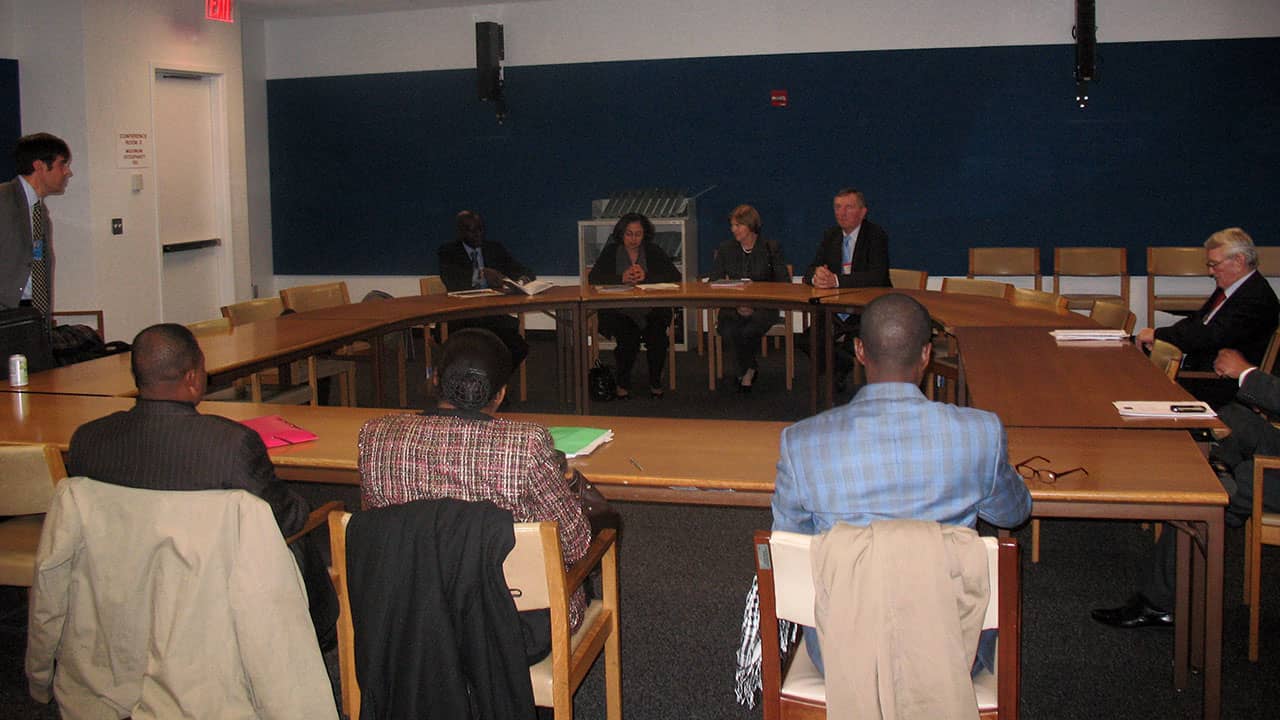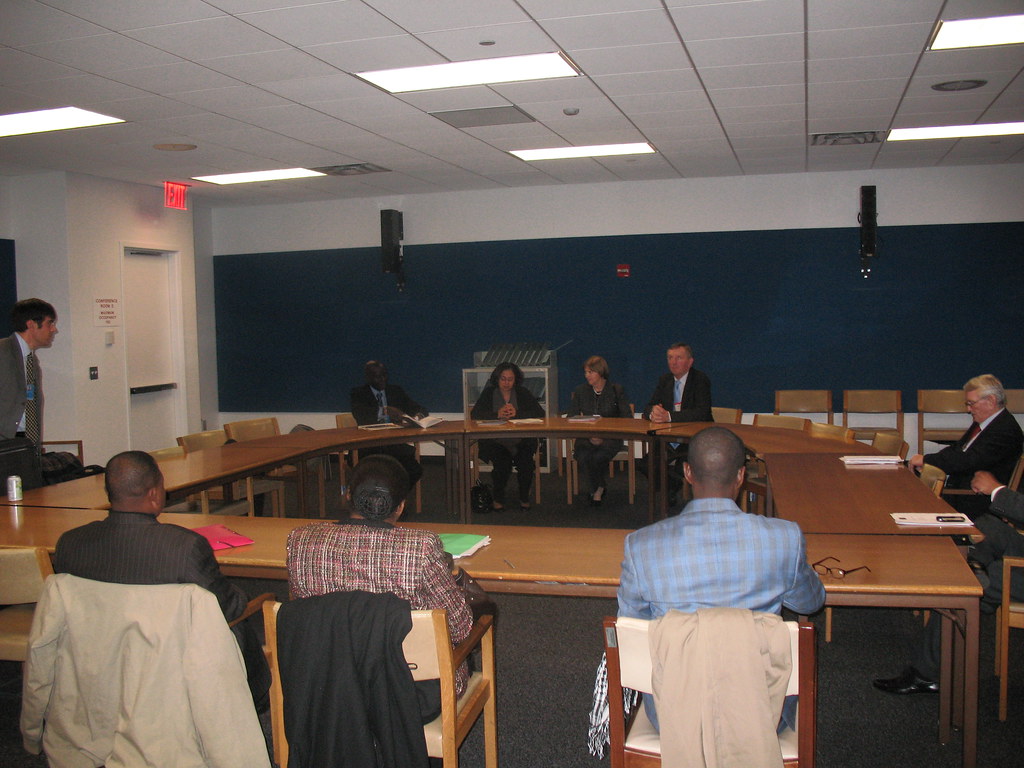
December 6 - 7, 2010 | UN Headquarters, New York
Hosted by the Permanent Mission of Ireland to the United Nations, and organized by PGA, a set of informal consultations with MPs on the key issue of Cooperation with the ICC took place in Conference Room D in the UN Building in New York on December 6, 2010, opening day of the 9th Assembly of States Parties (ASP) to the Rome Statute of the ICC.
These Strategic Consultations were successful in bringing together a wide range of those individuals most prominent and active in promoting Cooperation with the Court and provided a unique opportunity for the PGA Legislators attending the 9th session of the ASP to ask questions and obtain clarifications first hand on the many different aspects of, and perspectives on, this vital issue. PGA Members present intervened, several of them on more than one occasion, making for a lively and spirited afternoon of discussion and deliberation.
The Strategic Consultations were opened by Ambassador Mary Whelan (Ireland) who is also the Facilitator of the ICC ASP on Cooperation and acknowledged the important role that PGA has played and continues to play in this area. The Treasurer of the PGA Executive Committee, Mr. M.J. Nolan, MP (Ireland), and the PGA Secretary General, Ms. Shazia Rafi, welcomed the hospitality of the Irish Permanent Mission to the UN and stressed the commitment of PGA Members worldwide to be actively engaged on this most critical issue for the success of the fight against impunity, namely, the need to enforce all pending Arrest Warrants, as underscored by UN Secretary-General Ban Ki-Moon in his opening statement for the 9th ASP.
Mr. Amady Ba, Head of Cooperation from the Office of the Prosecutor of the ICC highlighted the main areas of work and ongoing challenges for the Court, which is a judicial body that does not have an international police or military force at its disposal. The Strategic Consultations saw also the intervention of the Prosecutor himself, Mr. Luis Moreno Ocampo, who reiterated that indispensible need of Member States to cooperate fully and unreservedly with the Court on a needs basis. He also reassured the MP from Kenya present that he believed that everything would proceed smoothly in connection with the summons to appear at the Court against those investigated for crimes against humanity allegedly committed during the post-electoral violence in Kenya in 2007-08. The summons have been issued by the relevant Pre-Trial Chamber on 15 December 2010.
The discussions with the OTP were followed by an interaction with Members of the Bureau of the Assembly of States Parties. Ambassador Jorge Lomonaco, Vice-President of the ASP and Chair of the Hague Working Group, underscored that without effective cooperation of States, the Court cannot fulfil its mandate. Ambassador Whelan agreed that the issue of cooperation/non-cooperation should be systematically addressed by States in the framework of the ASP and reported that the Assembly will establish clear procedures to address situations of non-cooperation and/or non-compliance. Mr. Akbar Khan, Director for Legal Affairs, Commonwealth Secretariat, reiterated the importance for States Parties to enact effective implementing legislation, providing for a clear legal basis and guidelines for States cooperation with the Court. The session was also joined by Amb. Juerg Lindenmann, Deputy Director, Directorate of international Law, Swiss Federal Department of Foreign Affairs and Head of the Swiss delegation to the ASP, who expressed support for the activism of PGA on this strategically important matter.
The civil society segment of the Consultations comprised of two presentations made by the Directors of Human Rights Watch?s International Justice Program, Mr. Richard Dicker (New York) and Ms. Geraldine Mattioli (Brussels), who highlighted the political, economic and diplomatic means that States have to secure effective cooperation, especially in the realm of the arrest and surrender of fugitives, drawing from the lessons-learned of the International Criminal Tribunals for the former Yugoslavia (i.e. Milosevic, Karadcic and Gotovina cases) and for Rwanda, as well as the Special Court for Sierra Leone (Charles Taylor case). Their presentations also gave rise to useful interactive question and answer session. The Director of PGAs International Law Program, Dr. David Donat Cattin, enlisted a number of areas in which States could usefully apply the existing law of state responsibility to remedy situations of non-cooperation or non-complinace with Court's orders and decisions that would amount to internationally wrongful acts.
Representatives from INTERPOL, the Rule of Law Unit and Department of Peace-Keeping Operations (DPKO) of the United Nations also provided informative and factual presentations on the extent to which their respective areas of work overlap or is connected with the issue of war crimes prosecutions and how they cooperate with themselves and UN Member States in this area, including in the dissemination of certain arrest warrants and the organisation of training programmes. The Director of the Rule of Law Unit at the Executive Office of the Secretary-General, Mr. Edric Selous, highlighted the recent work of relevant UN bodies in mainstreaming the concepts of complementarity in existing and new country-specific programmes aimed at strengthening and/or reforming national judicial, law-enforcement and penitentiary systems. The representative from DPKO, Mr. Robert Pulver observed that occasionally some sensitivity was needed on the ground in the area of prosecutions, given that the UN peace-operations need to receive a request from the territorial State to take action. Timing was a crucial issue and DPKO would not push for war crimes prosecutions ab initio if the likely consequence of this would be to de-stabilize the political situation on the ground, often fragile in the early post-conflict stages. The Chair of the PGA DRC Group commented, however, that in some situations, such as in the DRC, stabilization and peace can only be achieved through justice, and so far the ICC intervention has had a good impact for stabilisation, at least since the first democratic elections held in DRC in 2006. The Special Representative of the INTERPOL to the UN, Mr. Michael Olmsted, emphasized that INTERPOL works only in countries where the relevant law-enforcement agencies decide to utilise the tools and methods of his organisation, and explained the usefulness of the Red-Notices issued by the Interpol to all border and police authorities worldwide to give effect to all, but one, the ICC Arrest Warrants.
Parliamentarians made critical remarks and questions throughout the entire duration of these strategic consultations, which confirmed the need to increase interactions and coordinate efforts among all stakeholders in the crucial area of international cooperation, which must be driven by the political will of States to exercise their sovereign prerogatives to protect fundamental human rights and give teeth to national and international justice.
Other Actions of the PGA Delegation to the 9th Assembly of States Parties to the Rome Statute
The PGA delegation to the 9th ASP held several meetings with delegates of States, NGOs and International Organisations to exchange information and advance collaborative efforts to promote the goals of the Campaign for the Rome Statute of the ICC, including the universality of the Rome Statute. For example, PGA Member Mr. Collin Pratap, MP (Trinidad and Tobago), intervened in the ASP event on universality in the CARICOM region organised by the Permanent Missions of Slovakia and Trinidad and Tobago (programme of the event), which was particularly important to encourage the ratification process in Bahamas, Grenada, Jamaica and Haiti.
PGA also addressed the plenary of the 9th ASP on 9 December 2010.
Last, but not least, the President of the ICC, Judge H.-Y. Song, honoured the PGA delegation with his participation to an informal dinner organised by the PGA Secretariat and visited the PGA headquarters on 7 December 2010, where he addressed the questions posed by MPs from DR Congo, Kenya, Tanzania and Denmark in respect of the efficiency, effectiveness and preventative impact of the Court?s jurisprudence.
For more information, please contact Dr. David Donat Cattin, Director, International Law and Human Rights Program,

